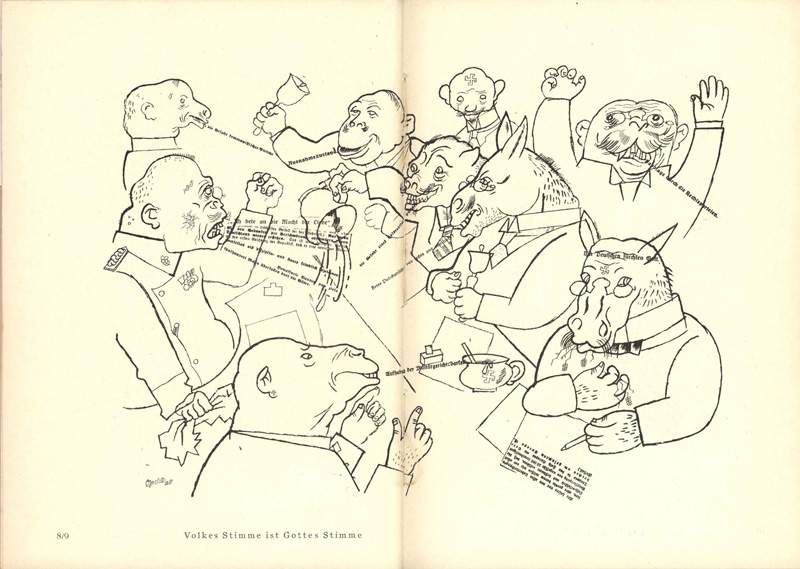A person's standards of behaviour or beliefs concerning what is goodness and rightness in character and behaviour.
In the Kantian tradition, a persons’ moral worth relies on the quality of his/her will, and not on external conditions. Thus one acts rightly because it is right. The morals is based on notions of duty, obligation, and principles of conduct, while the ethics is based on the notion of virtue, closer to Aristotelian approach to practical reasoning. In everyday life the propensity for moral thinking of persons depends greatly on external circumstances, way of life, emotions, self-interest, or cultural habits. It is influenced by the matters of chance and choice like in the case of moral dilemma when whatever one might do, it is something ought not to be done.
Recommended artwork

enlarge image
“The Face of the Ruling Class,” a book by George Grosz, 57 political drawings, Berlin: Malik Verlag, 1921
Source Digital Dada Library, The University of Iowa 2007
George Grosz, a member of the Berlin Dada and New Objectivity group, satirically portrayed life in Berlin and the Weimar Republic during the 1920s. Although he was accused for offences against public morality, his major theme was amorality of a man. “My drawings expressed my despair, hate and disillusionment” he said. His aim was to be understood by common people, so he made caricatures in magazines and newspapers. The anti-war works were uncompromising critic of the military caste, violence, nationalism and dictatorship. His drawings series, published by Malik Verlag within edition "Kleine revolutionare Bibliothek," included titles as: Das Gesicht der Herrschenden Klasse (The Face of the Ruling Class); Ecce Homo (Behold the Man), Gott Mit Uns (God with us), Im Schatten (In the Shadow) and Die Rauber (The Robbers). The drawing "Shut up and keep serving the cause" (1928) brought him charge with an offence of blasphemy.
An example in the ARTS -> “The Threepenny Opera”
"You gents who to a virtuous life would lead us
And turn us from all wrongdoing and sin
First of all see to it that you feed us
Then start your preaching
That's where to begin
All you who love your paunch and our propriety
There's one thing you must finally realize
No matter how you try to twist and turn it
First comes the grub
Then you can moralize
There must first be a chance for all now poorly fed
To get their slice
Of life's great loaf of bread
How does a man survive?
By daily cheating
Mistreating, beating others
Spitting in their face
Only that man survives
Who's able to forget
That he's a member of
The human race
Gentlemen
This truth you cannot shirk
Man lives exclusively
By dirty work"
REF -> The opening song of Bertolt Brecht’s musical The Threepenny Opera. Lyrics Bertolt Brecht, Music Kurt Weill, based on John Gay's The Beggar's Opera, 1728. The film had its premiere in Berlin on February 19th 1931, it was restored in 2006 for the films 75th anniversary from the original negative in the German Federal Archives.
http://en.wikipedia.org/wiki/File:Threepennyopera1931.jpg